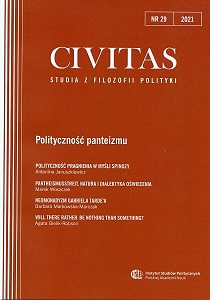Will There Rather Be Nothing Than Something? On Modern Pantheism and Its Aporias in Ernst Bloch
Will There Rather Be Nothing Than Something? On Modern Pantheism and Its Aporias in Ernst Bloch
Author(s): Agata Bielik-RobsonSubject(s): Metaphysics, Contemporary Philosophy, Marxism, Philosophy of Religion, Ontology, Philosophy of History
Published by: Instytut Studiów Politycznych PAN
Keywords: materialism; pantheism; gnosticism; modernity; Ernst Bloch; Hans Blumenberg; Giorgio Agamben;
Summary/Abstract: The purpose of this essay is to put Ernst Bloch’s philosophy to a test suggested by Hans Blumenberg in The Legitimacy of the Modern Age. According to Blumenberg, modernity constitutes the second, successful, attempt at overcoming Gnosticism, after the first attempt, undertaken by Christianity, had failed. However – Blumenberg argues – it was not modern philosophy, but only science which had managed to escape Gnosticism’s ontological trap of viewing the world as an illusion bordering on nothing. Modern metaphysics had proved unable to liberate itself from the powerful pull of the Gnostic rejection of being, in spite of all philosophical efforts to affirm the existence of material reality. Even when claiming to be materialist, it had remained, in its core, suspicious about matter as an imperfect and privative mode of being. Ernst Bloch, one of the strongest proponents of panthestic vitalism in late modernity, seems to be trapped in a similar aporia: while he attempts to use – and simultaneously overcome – his early apocalyptic Gnosticism, fully manifest in The Spirit of Utopia, for the sake of the material reality and speculative materialism which combines Marx, the Aristotelian Left, and Schelling, he still remains a thinker of the apocalypse, who wishes the world to end in a violent destruction of all matter.
Journal: Civitas. Studia z filozofii polityki
- Issue Year: 2021
- Issue No: 29
- Page Range: 105-125
- Page Count: 21
- Language: English

